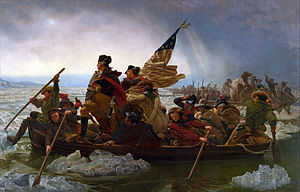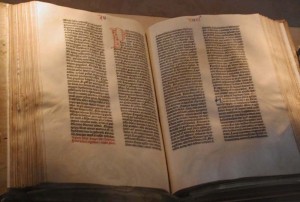Founding Fathers Friday: The Beehive
 Chances are good you have his face in your wallet or purse right now, but when did George Washington really become the father of our country?
Chances are good you have his face in your wallet or purse right now, but when did George Washington really become the father of our country?
America as we know it might not exist today if Washington had made a different decision than he did at 3 a.m. on the morning after Christmas, 1776, while sitting on a beehive stuck in a frozen riverbank in New Jersey.
We might then know of Washington as a mere footnote in history, “a little paltry colonel of a militia of bandits,” known only to scholars and enthusiasts as another obscure leader of a failed resistance movement. (1)
Alternative histories aside, a closer look at Washington that morning, when he led a ragged group of desperate men across the Delaware River in an attack on the British at Trenton, reveals a man at the end of a rope.
Things had never looked bleaker for the American patriots. Washington had even admitted as much in a recent letter to his brother John Augustine Washington, writing “I think the game is pretty near up.” (2)
Even the weather seemed to be conspiring against Washington. He sat brooding on the rotting overturned crate that had once been a local farmer’s beehive as a furious winter storm hampered the crossing.
With almost nine miles still between him and Trenton, any attack now would be hours after sunrise. Despairing, he contemplated calling off the attack.
His kairos moment appeared before him here, now, as he sat on the beehive in the middle of the night. He must make a decision.
And so he did.
Above all else, the most prominent characteristic Washington displayed that morning was a complete sense of resolve to see his idea through, even in the face of ever mounting obstacles.
The passing hours had given Washington time to fall back on the iron willpower that constituted so much of his character. He would later tell John Hancock, “I determined to push on at all events.” (3)
One anonymous eyewitness is said to have noted in his diary, “I have never seen Washington so determined as he is now…He stands on the bank of the stream, wrapped in his cloak, superintending the landing of his troops. He is calm and collected, but very determined.” (4)
To Washington, his determination to follow through on the success or failure of the gamble was very personal. Much of what constituted his iron will that night grew out of who he was as a man. He was truly an exceptional man, but what made him extraordinary was his natural ability to do so many ordinary things so very well, and keep doing these things when it counted.
Washington and his aides, who had worked to compile excellent intelligence on the ground in New Jersey, had earlier realized that the British were momentarily weak. America’s fortunate reversal at Trenton came about because Washington was quick to recognize this seemingly small opportunity in those weeks before Christmas 1776.
But Washington alone could make the most out the available opportunity because his great determination and flexibility also made him the strongest survivor (three other attacks across the river failed that night).
The defeat of the British at Trenton paved the way for Washington’s subsequent victory at Princeton and completely reversed America’s fortunes in the Revolutionary War. The twin victories sent shockwaves reverberating throughout the British Empire and awakened a new respect for Washington and the American cause.
That morning—by sheer determination—Washington summoned enough rebel energy to drive a flying shuttle through the loom of the British defenses when the right opening occurred, and by so doing, created one of the greatest kairos moments in American history.
On the beehive see Richard Ketchum, The Winter Soldiers: The Battles for Trenton and Princeton (New York: Henry Holt and Company, 1973), 252.(1) Edward Tatum, Jr., ed., The American Journal of Ambrose Serle, (New York: New York Times/Arno Press, 1969), 35.
(2) GW to John Augustine Washington, Dec. 18, 1776, in The Writings of George Washington 6:396.
(3) GW to John Hancock, Dec. 27, 1776, in WGW 6:442.
(4) The authenticity of the often quoted “Diary of an Officer on Washington’s Staff” is the subject of debate among recent scholars. It is often attributed to Lieutenant Colonel John Fitzgerald, one of Washington’s aides de camp, but no original has ever been found. Regardless, in this case, Washington’s resolve is self-evident and the description rings true. See David Hackett Fischer, Washington’s Crossing (New York: Oxford University Press), 422.

